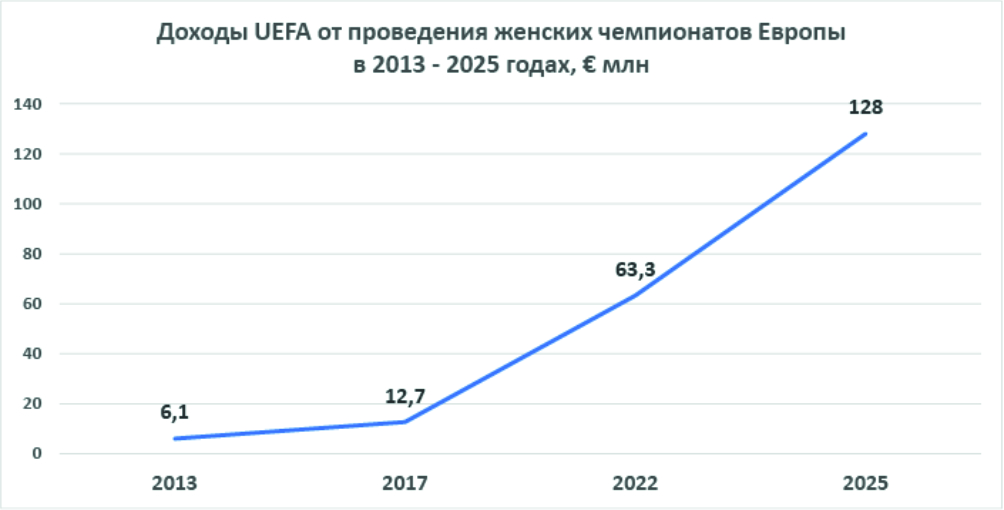
Financial expectations from women’s tournaments are growing every time. While in 2005 UEFA earned €3.9 million from a tournament featuring the eight strongest European women’s national teams, in 2025 the revenue from the 16-nation championship increased almost 33-fold to €128 million. More than half of the revenue came from the sale of TV rights – €72 million. Euro 2025 was broadcast in almost 200 countries, where it was watched by about 500 million viewers (125 million more than the tournament three years ago).
Sponsorship agreements allowed UEFA to earn €41 million (€15.3 million in 2022). The high level of interest in the tournament shown by the companies proves that women’s soccer is of significant commercial interest. The sale of tickets and accompanying services contributed €15 million to the budget of the tournament. 600,000 tickets were sold before the start of the championship out of the approximately 677,000 available.
The more than twofold increase in organizational costs (€113 million instead of the original €57 million) did not make the tournament profitable.
Thus, the costs of hiring personnel for the duration of the tournament, security and stadium maintenance were significantly increased. Compared to Euro 2017, the costs increased 10 times (the tournament cost UEFA €11 million).
A record prize fund of €41 million was set at the Women’s Championship. It is 24 times less than the one set at the Men’s World Cup, but it is much more tangible compared to previous Women’s Championships. In addition, the tournament in Switzerland was the first in which UEFA obliged national associations to allocate up to 40 percent of the total payout to women’s national team players, so all female participants are guaranteed a share of the prize money.
More than 4% of the total prize money goes to the winners, but to this amount must also be added €1.8 million, which is allocated as a bonus from UEFA for guaranteed participation in the tournament. Three years earlier, the bonus was exactly three times smaller. Results during the group stage also allowed the national teams to earn €100,000 for a win and €50,000 for a draw. Each of the four teams that topped the standings in their groups (Norway, Spain, Sweden and France) received an additional €100 thousand.
|
Prize money of the participants of the Women’s European FootballChampionship 2025 |
||
|
№ |
Result / Teams | Prize money* |
|
1 |
Champions (England) |
€1.75 million |
|
2 |
Vice-Champions (Spain) |
€850k |
|
3 |
Semi-finalists who did not make it to the next round (Italy, Germany) |
€700k each |
|
4 |
Participants of the 1/4 finals, who did not pass to the next round (Norway, France, Switzerland, Sweden) |
€550 thousand each. |
| * The prize money allocated to the national teams directly for their results at the tournament is indicated | ||
UEFA took care of the leagues that had a season even during the European Championship. A solidarity program was introduced, under which all clubs whose players were called up to the national teams participating in Euro 2025 received compensation of up to €9 million. This is more than double the amount spent during the championship three years ago – €4.3 million. For each day of absence of one athlete, the club is guaranteed a payment of €985 or a minimum of €19,700 for the entire time she was absent due to her performance at the continental championship.
European soccer officials realize that in light of the significant increase in costs, it is not reasonable to expect a profit and, even though the net loss is about €25 million, they are ready to invest in the promotion of women’s soccer in the future. “We invest more even if we don’t earn anything, because it’s the right thing to do,” said Nadine Kessler, Head of Women’s Football at UEFA.
Kessler’s words correlate with UEFA’s vision for the promotion of women’s soccer, which aims to make it the most popular team sport among women in European countries and create six professional leagues with more than 5,000 professional female players on the continent by 2030.

* The amount of revenue from Euro 2025 is inconclusive. Data from UEFA

